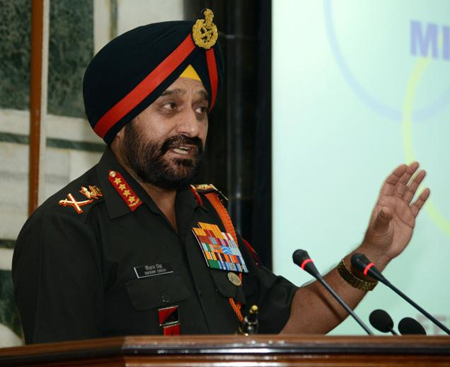 New Delhi, Jan 14: Terming as "unpardonable" the beheading of a soldier by Pakistan on the Line of Control, Army chief Gen Bikram Singh on Monday warned that India's military will retaliate aggressively in case of any further provocation.
New Delhi, Jan 14: Terming as "unpardonable" the beheading of a soldier by Pakistan on the Line of Control, Army chief Gen Bikram Singh on Monday warned that India's military will retaliate aggressively in case of any further provocation.
Talking tough, he said the killing of two Indian soldiers on the LoC in Mendhar area of Jammu and Kashmir on January 6 was a pre-planned and pre-meditated action by Pakistani troops and India reserves the right to retaliate at "time and place of its choice".
Addressing a press conference here on the eve of Army Day, Gen Singh said India's response to Pakistani firing at its posts in LoC in J and K is measured and perfect.
He said the ceasefire, in place since November 2003, has been holding except for "some aberrations" for which he squarely blamed Pakistan.
"Beheading (of Lance Naik Hemraj) is unacceptable and unpardonable," the Army chief said about the incident in which Pakistan soldiers crossed into the Indian territory to attack Indian Army patrol party.
"It (the attack) was stage-managed and pre-planned (by Pakistan). They (Pakistan) have planted lies to justify what they have done," he said.
He said the attack was carried out by Pakistan army personnel but did not rule out the possibility of Lashkar-e-Taiba terrorists being associated with it.
Gen Singh said while the issue is being taken up with Pakistan at government and military levels, directions have been given to Army commanders to respond immediately if provoked.
"India reserves its right to retaliate at the time and place of its choice. We won't remain passive when attacked," he said, adding he expected "commanders to be aggressive and offensive."
Hitting out that the Pakistan army, Gen Singh said beheading is against all rules of engagement.
At the same time, he said there were some "tactical errors" on part of the local unit which will be looked into later as an inquiry at the moment will affect the morale of the forces.
"Our teams should be balanced to take on the onslaught of the enemy," the Army chief said.
Putting the onus of maintaining the ceasefire on Pakistan, the Army chief said India will uphold it as long as the "adversary" does.
He applauded the Indian Army Commanders at the LoC, saying they did a "great job". Gen Singh discounted the possibility of the skirmish leading to a full-fledged war and was dismissive of Pakistan's nuclear blackmail, saying it had no relation to the local conflict. "Indicators does not show upping the ante," he said.
On any response to the Pakistani action, he said it has to be the decision of the government.






Comments
Add new comment